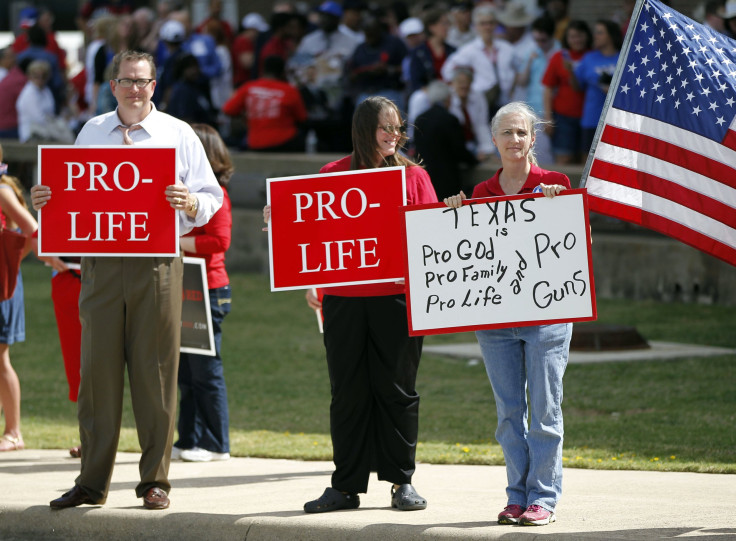Abortion Laws By State 2016: Texas Proposes Bill Restricting Partial Birth Abortions And Fetal Tissue Donations

A group of senators in Texas put forth a bill Tuesday proposing yet another amendment to the state's abortion laws. The bill, called the Pre-Born Protection and Dignity Act, would prohibit partial-birth abortion, which it defines as a procedure where "the partially delivered living fetus is aborted." It would hold any doctor who performed such abortions criminally liable.
The bill also seeks to ban the donation of fetal tissue to unauthorized institutions. Only accredited universities with approved research would be allowed to take fetal tissue donations and any donations from elective abortions would be prohibited, according to the Dallas Morning News.
The law's opponents say that even if it passed next year, it would have an insignificant impact on abortions in the state because partial birth abortions are illegal under federal law and most clinics rarely take fetal donations. The bill was written by Sen. Charles Schwetner in response to footage leaked in 2015 that allegedly showed Planned Parenthood officials discussing the sale of fetal body parts. Planned Parenthood was cleared of any wrongdoing after an investigation into the videos.
"Nothing we do is more important than protecting innocent life. Texans count on us to do everything possible to make sure that the sanctity and dignity of life is protected," said Lt. Gov. Dan Patrick, who supports the bill. "In the wake of discovering the notorious Planned Parenthood videos last year, in which employees were caught callously discussing the procurement of aborted baby parts, the Texas Senate is taking aggressive steps to criminalize these despicable acts."
The new bill comes after the U.S. Supreme Court struck down one of Texas' more restrictive abortion laws in June, one that required abortion-providing doctors to have admitting privileges at hospitals and clinics to meet stringent surgical standards. The court ruled that such a law placed an "undue burden" on women in the state.
Texas is still home to some of the country's strictest abortion laws. The state assumes all women seeking abortions are minors until proven otherwise, and mandates all doctors to require proof of identification before performing an abortion. In 2011, Texas passed a law requiring women to visit at least two abortion facilities before opting to have a procedure. It also has a law on the books called the "Women's Right to Know Act," which requires doctors to provide any woman seeking an abortion with information about alternatives, medical risks and the developmental stages of a fetus.
Thirty-six percent of Texans view abortion as a matter of personal choice, according to a 2013 University of Texas/Texas Tribune poll. Thirty percent said it showed be allowed only in cases of rape, incest or danger to a woman's life. Thirteen percent said it should only be allowed in cases where need is clearly established, while 16 percent said it should never be allowed. That same poll, however, showed that 38 percent of Texans felt abortion laws in the state should be stricter. Twenty-six percent said they should be less strict, while 21 percent said they should remain the same.
© Copyright IBTimes 2024. All rights reserved.












